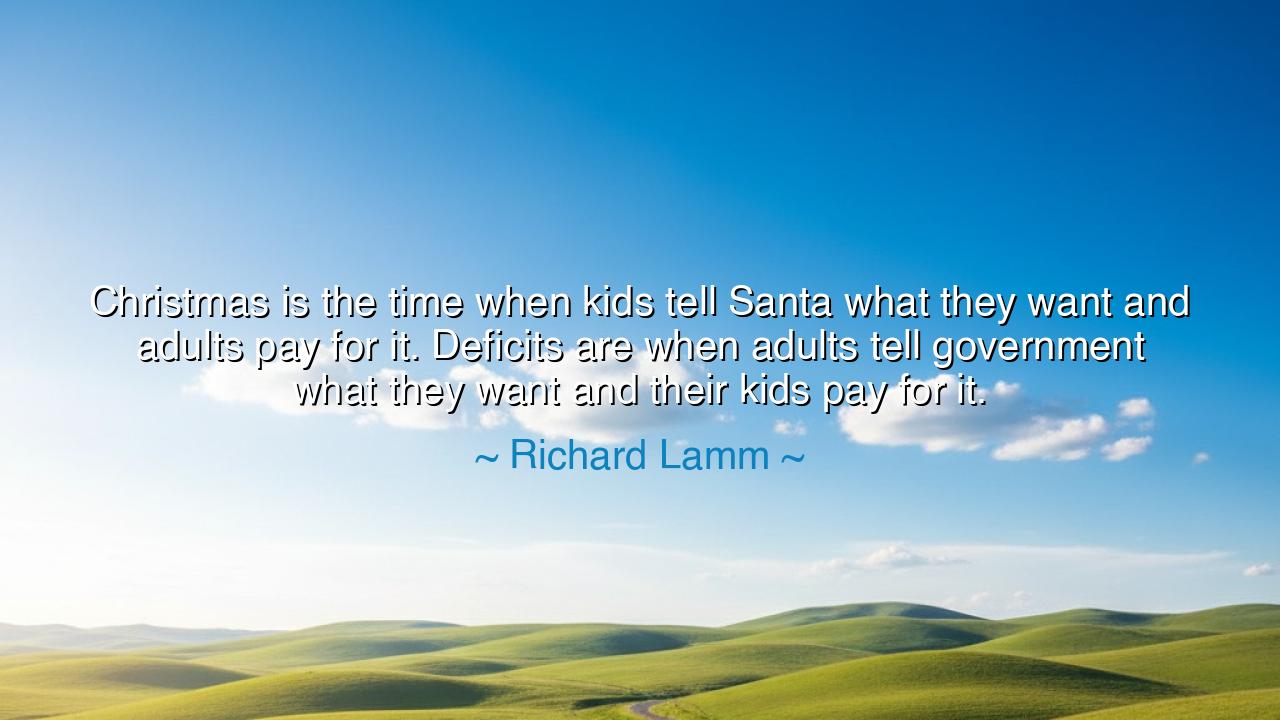
Christmas is the time when kids tell Santa what they want and
Christmas is the time when kids tell Santa what they want and adults pay for it. Deficits are when adults tell government what they want and their kids pay for it.






Host: The soft glow of the café’s lights cast long shadows on the walls as the evening settled in. Outside, the world was cold, the hustle and bustle of the city muffled by the gentle hum of conversation inside. Jeeny and Jack sat at the corner, their coffee cups nearly empty, their minds lost in the rhythms of the conversation. Jeeny, always looking to draw out something deeper, spoke first, her voice thoughtful but sharp.
Jeeny: “I came across something Richard Lamm said, and it really made me think. He said, ‘Christmas is the time when kids tell Santa what they want and adults pay for it. Deficits are when adults tell government what they want and their kids pay for it.’” She paused, looking at Jack carefully. “What do you think of that? Do you think he’s right? Is the way we approach government spending essentially the same as the way kids ask for presents?”
Jack: He smirked, leaning back in his chair, his fingers absently tracing the rim of his coffee cup. “I think it’s a clever analogy, but I’m not sure it’s that simple. Sure, we have this tendency to ask for more than we can afford—whether it’s presents or government programs. But the issue with government spending isn’t just about asking for what we want; it’s about how we manage that demand, how we prioritize. The idea of deficits isn’t so much about kids paying for the gifts, but about whether we’re creating a sustainable future or just shifting the burden onto the next generation.”
Host: The flickering light from the street outside filtered through the café window, casting shifting shadows on the table between them. Jeeny’s gaze remained steady, her tone soft but insistent as she pushed the conversation forward.
Jeeny: “But isn’t that the core of what he’s saying? The whole issue with deficits is that adults are making decisions—whether it’s spending on government programs or tax breaks—without fully considering how those decisions will impact future generations. Just like kids asking Santa for what they want without any understanding of the cost, adults are asking the government for things that we won’t have to pay for directly, but our kids will inherit the debt.” She paused, her voice becoming more reflective. “It’s like a cycle that we’re passing on, a burden we don’t want to face.”
Jack: “Yeah, but that doesn’t mean the whole system is broken,” he said, his voice sharpening slightly. “The reality is, there will always be some level of debt, especially in a growing economy. Governments aren’t supposed to run on surpluses all the time—they have to respond to immediate needs and invest in future growth. It’s not about never spending; it’s about being responsible with how and when we borrow. But sure, it gets tricky when the system isn’t designed to ensure that future generations can handle that debt without becoming overburdened.”
Jeeny: “Right, but that’s the problem, isn’t it? The way we think about debt is completely misaligned. It’s easy to say we’re investing in future growth, but when that growth isn’t guaranteed, and when the interest on that debt starts to weigh heavier, how do we make sure we’re not setting up the next generation for failure?” Her voice softened again, almost sadly. “I think what Lamm is pointing out is that we’re constantly passing the buck, pushing the cost of our desires onto the shoulders of people who don’t yet have the ability to make the decisions, to make the choices we’ve made.”
Host: The atmosphere in the café shifted, a quiet tension hanging between them. The rain outside had picked up again, its soft pattering creating a rhythm that almost mirrored the way their words were unfolding. Jeeny’s voice had grown quieter, but there was a new sense of clarity in her perspective, something Jack could no longer dismiss.
Jack: “I see where you’re coming from now. Maybe we don’t always think about the long-term consequences of what we’re doing today. Maybe we’re too focused on instant gratification, whether that’s with the government or with our own personal desires. It’s easy to want something without considering the cost, but eventually, someone has to foot the bill. And it’s the next generation that ends up paying for our choices.” He let out a deep breath, his voice quieter now. “It’s the cycle of asking for more than we can afford.”
Jeeny: “Exactly,” she said softly. “It’s about being honest about the cost, about thinking about the long-term impact of the decisions we make today. If we don’t, we’re just setting up the next generation to inherit a debt they didn’t ask for, a burden they have no control over. And the more we do it, the harder it gets to break free of that cycle.”
Host: The rain outside had slowed again, but the weight of their words still lingered, like the fading echo of a song long after the music has stopped. Jack and Jeeny sat in a quiet moment of understanding, each of them realizing how deeply their choices, whether personal or political, can reverberate through time. Maybe the question wasn’t just about what we ask for, but who ends up paying the price. And perhaps the true challenge was finding a way to balance what we want with the responsibility to those who will inherit the consequences of our decisions.






AAdministratorAdministrator
Welcome, honored guests. Please leave a comment, we will respond soon